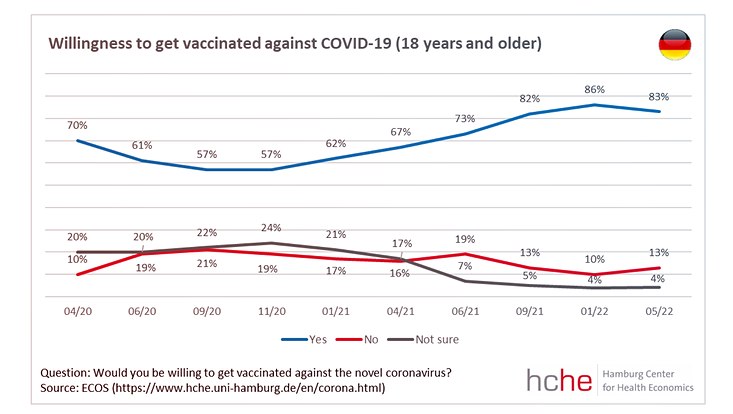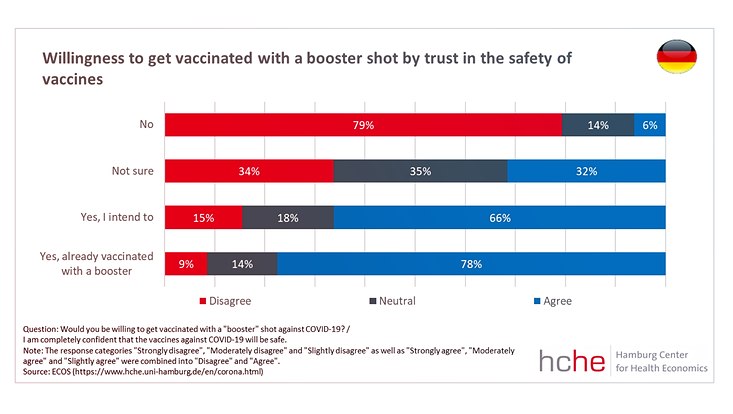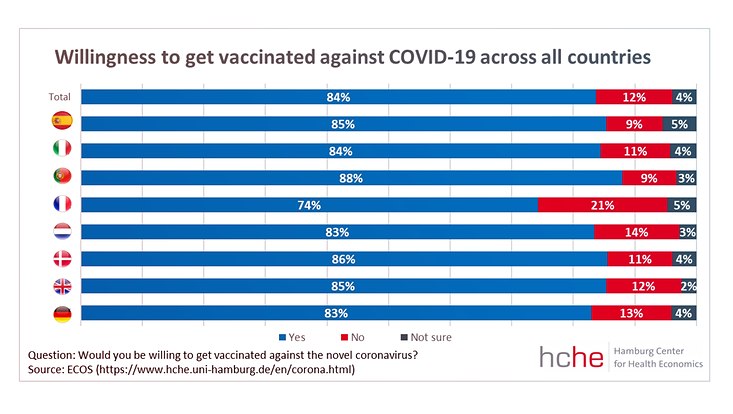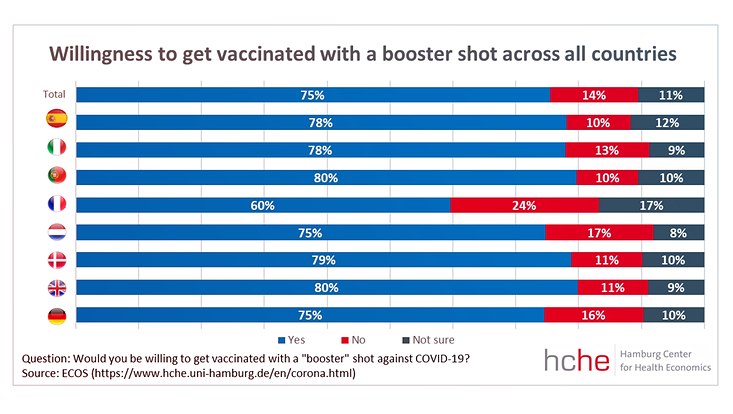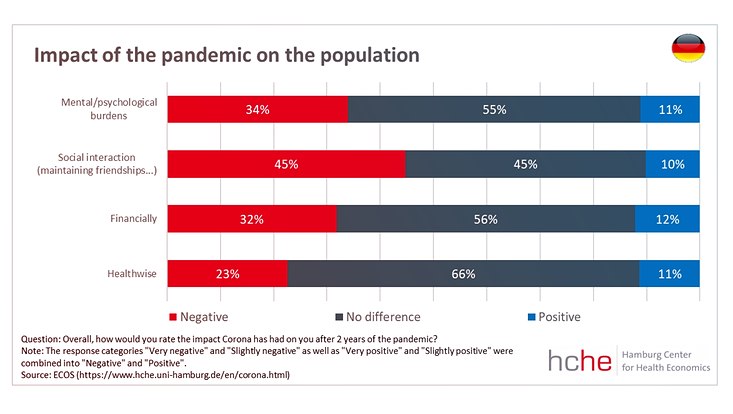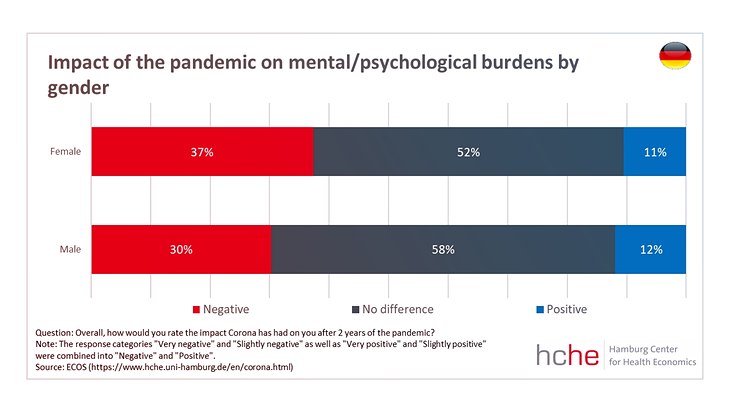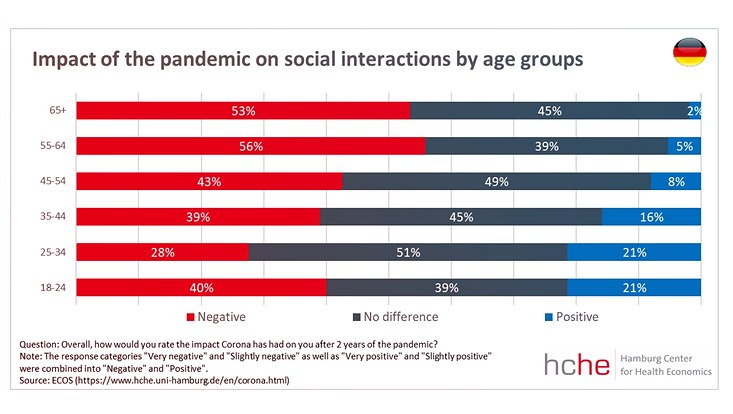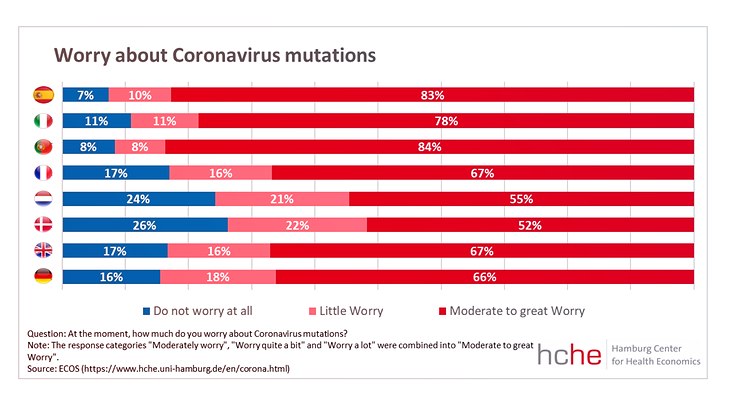Tenth wave of surveys in Mai 2022
Results of the 10th survey wave from 4th to 24th of May 2022
European COvid Survey (ECOS): Concern about new mutations, willingness to get vaccinated decreases slightly
Two-thirds of all people in Germany (66 percent) are worried about new coronavirus mutations, and one in five even say they are very worried. Meanwhile, fewer and fewer people are willing to receive a booster vaccination, as the latest survey of the representative European COvid Survey (ECOS) from May shows. It is conducted regularly by the Hamburg Center for Health Economics (HCHE) at the University of Hamburg and surveys more than 8,000 people in 8 countries.
"The concern about another wave is real among the population and shows that for many people the pandemic is not over yet," says Jonas Schreyögg, scientific director of the HCHE. This is not only evident in Germany, but also in other European countries. More than 75 percent of people in Spain, Italy and Portugal fear new mutations; people in Denmark in particular (52 percent) are less worried.
Nevertheless, the general willingness to get vaccinated in Germany has dropped from 86 to 83 percent since the beginning of the year. The willingness for a booster vaccination is considerably lower at 75 percent. 16 percent are currently against it, 9 percent said they were still unsure. This puts Germany in the lower midfield among the countries surveyed, but well ahead of France, which is in last place by a wide margin. Only 74 percent of the French population are still generally willing to be vaccinated, and less than 60 percent are in favour of a booster vaccination. "The decreasing readiness for a booster vaccination could again cause more severe cases of infection in autumn and winter with another Corona wave," says Jonas Schreyögg and recommends to address in time with suitable communication measures especially those people who are still uncertain about a booster vaccination and those who would be ready but have not yet implemented this (20% in Germany). Of those who are still uncertain, 34% said that they mistrusted the safety of the Corona vaccines. For every second person, however, vaccinations are important in principle. Moreover, the willingness to be vaccinated against Covid-19 increases with the level of education and information. The more people are informed about the pandemic and trust the information from the government and the media, the more willing they are to be vaccinated.
2 years of the pandemic and its impact
Despite concerns about the future course of the pandemic, most people have come through the past two years in good health. Two-thirds of respondents have not noticed any changes, and 11 percent have even seen their health improve. However, 23 percent also expressed a deterioration. The pandemic has had a somewhat greater impact on the mental health of the respondents. Every third person reports negative effects, women more often than men. The pandemic had the greatest impact on social participation. For almost every second person (44 percent), it was more difficult to maintain friendships or participate in social life in the past two years. This is particularly pronounced in the 55+ age group. Financially, the pandemic had no or even positive effects on the majority (68 percent). However, the data also show that Corona has led to a greater financial burden, especially for low-income earners and women.
A presentation of the results from all survey waves can be found under the following link: https://www.hche.uni-hamburg.de/corona.html.
Note: The willingness to vaccinate refers to the representative sample of the total population and includes vaccinated and not yet vaccinated respondents.
About the European COvid Survey (ECOS)
For the European COvid Survey (ECOS), 7,000 people in Germany, Denmark, France, the United Kingdom, Italy, the Netherlands and Portugal have been surveyed approximately every two months since April 2020. The aim is to measure the attitudes and concerns of people in Europe about the course of the pandemic. One focus is the topic of vaccination. About half of the respondents have already taken part several times. Some of the questions always remain the same and thus reflect changes over time. In addition, new questions are added that pick up on current events. In the meantime, eight survey waves have taken place; in the last survey in July, Spain was added as a further country. Thus, the number of respondents increased to 8,000. The current survey took place from 23 December 2021 to 11 January 2022.
Cooperation partners:
ECOS is a joint project of the Nova School of Business and Economics (Portugal), Bocconi University (Italy), Erasmus University Rotterdam (Netherlands) and the University of Hamburg (with funding from the Excellence Strategy) and receives funding from the German Research Foundation.


